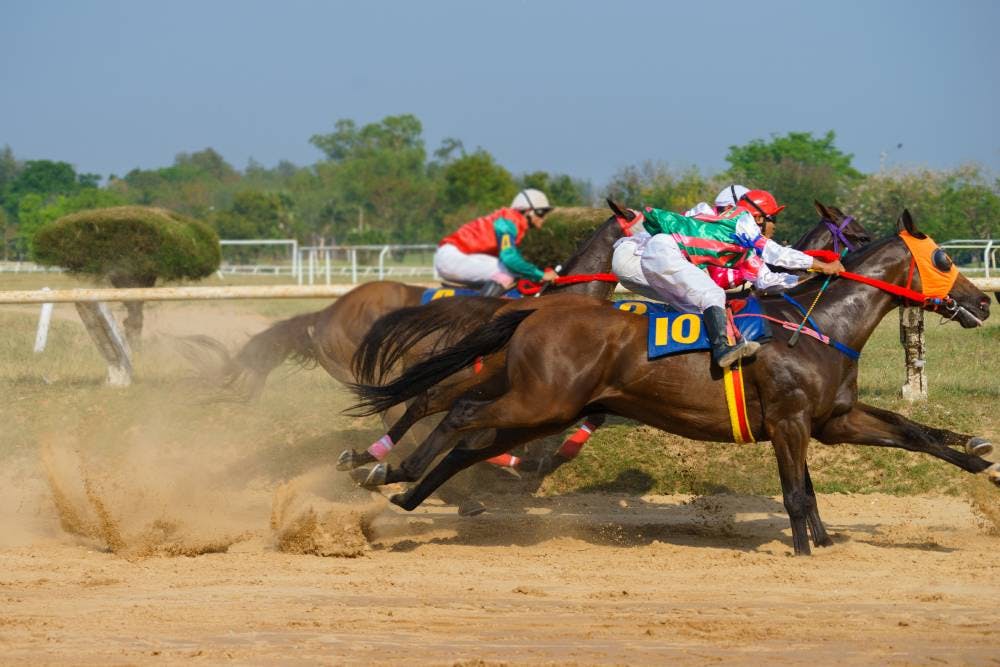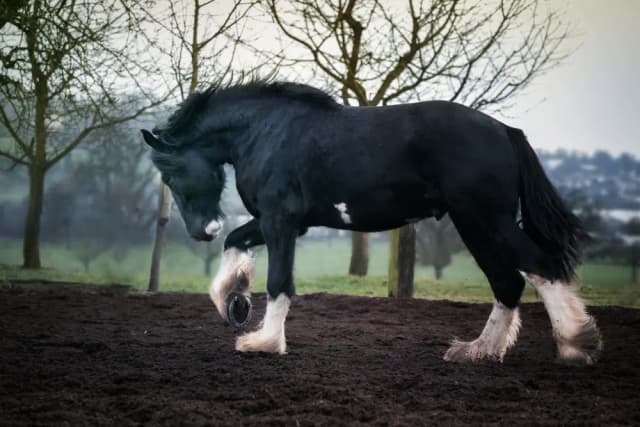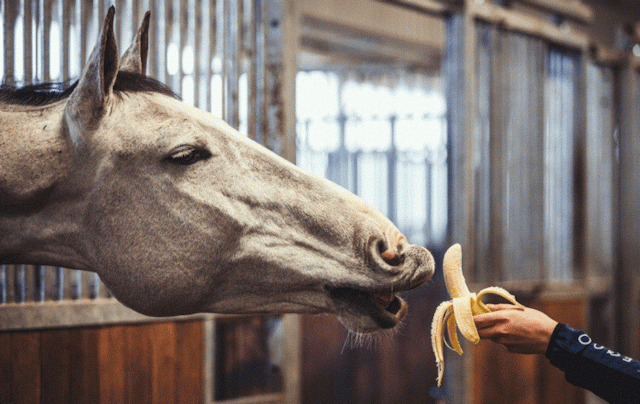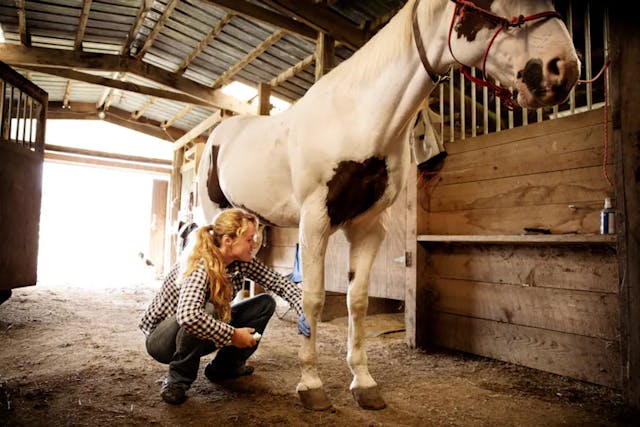How Fast Can a Horse Run
World of horse speeds, including top racing breeds, key factors affecting their capabilities, and how different gaits and training contribute to a horse's overall performance.
Published: Mar 27, 2023

Share
Contents
How Fast Can a Horse Run: A Comprehensive Guide
Horses have always been admired for their power, grace, and speed. Indeed, when it comes to the question of "how fast can a horse run?", there are several factors to consider, including the breed, age, and training of the horse. In this article, we'll delve into the world of horses and their impressive speed capabilities.
Average Horse Speed
The average horse can reach speeds of up to 30 miles per hour (mph) when galloping. However, this is just an average, as different breeds possess varying speed capabilities. Generally, horses can maintain a speed of 30 mph for a short distance, but they are unable to sustain these high speeds over long distances.
Moreover, the horse's speed is also affected by whether it's carrying a rider or not. As you might expect, a horse carrying a rider will typically be slower than one running free.
Horse Racing and Speed
Horse racing has been a popular sport for centuries, showcasing the remarkable speed and agility of these animals. In this context, the thoroughbred and quarter horse breeds are known for their exceptional speed capabilities.
Thoroughbred Horses
In the world of horse racing, thoroughbred horses are the stars. Known for their speed and stamina, they are often found racing on flat tracks over distances of a mile or more. A thoroughbred's top speed has been recorded at around 40 mph, making them some of the fastest horses in the world.
Quarter Horses
On the other hand, the quarter horse is famous for its prowess in short distance racing , particularly in races that span a quarter of a mile, hence the name. While the top speed of a thoroughbred is impressive, quarter horses can reach even higher speeds, up to 55 mph, over shorter distances. This makes them the ideal choice for sprint racing events.
Notable Horse Racing Records
In horse racing history, some records stand out, demonstrating the incredible speed of these animals. One such record belongs to a horse named Winning Brew, who reached an astounding speed of 70.76 kilometers per hour (43.97 mph) in 2008. To provide context, 70 km/h is equivalent to approximately 43.5 mph.
Factors Affecting a Horse's Speed
The speed of a horse can be influenced by various factors, including breed, age, and training. Let's explore these factors in more detail.
Breed
As previously mentioned, certain breeds are known for their speed, such as thoroughbreds and quarter horses. Other breeds, like draft horses, are built for strength and endurance rather than speed. Consequently, the breed of a horse plays a significant role in determining its maximum speed.
Age and Training
Additionally, a horse's age and training can greatly impact its speed. Younger horses are usually faster, with their speed naturally decreasing as they age. Likewise, proper training is essential for a horse to reach its full speed potential.
Speed Over Long Distances
Horses are not built to maintain their top speeds for extended periods. Over long distances, their average speed decreases considerably. For example, the speed of a horse running a marathon (26.2 miles) would be significantly lower than its top speed over a short distance.
Endurance horses, specifically bred for long-distance races, can maintain an average speed of 10-15 mph for distances of up to 100 miles. Although this is slower than the top speeds of thoroughbreds and quarter horses, these breeds excel in maintaining a consistent pace over long distances, making them ideal for endurance racing.
The Impact of Carrying a Rider
As previously mentioned, a horse's speed can be affected by carrying a rider. The added weight and balance of a rider can slow a horse down, particularly if the rider is inexperienced or has poor riding skills.
In horse racing, jockeys are typically lightweight and agile, which helps minimize the impact on the horse's speed. Moreover, professional jockeys are skilled at guiding and encouraging their horses to reach their maximum potential during a race.
Transitioning Between Gaits
Horses have several gaits, including the walk, trot, canter, and gallop. When discussing a horse's speed, it's essential to consider the different gaits and how horses transition between them.
Walk
The walk is the slowest gait, with an average speed of around 4 mph. It's a four-beat gait, meaning each of the horse's four hooves hits the ground independently.
Trot
The trot is a two-beat gait, where the horse moves its legs in diagonal pairs. The trot's average speed is approximately 8-12 mph, depending on the breed and individual horse.
Canter
The canter is a three-beat gait, characterized by a rocking motion. Horses typically canter at speeds ranging from 10-17 mph. The canter is often considered a comfortable gait for both horse and rider, as it provides a smooth, rhythmic movement.
Gallop
Finally, the gallop is the fastest gait, where horses can reach their top speeds. As mentioned earlier, thoroughbreds can gallop at speeds up to 40 mph, while quarter horses can reach even higher speeds over shorter distances. The gallop is a four-beat gait, with a moment of suspension where all four hooves are off the ground.
The Importance of Training and Conditioning
To help a horse achieve its maximum speed, proper training and conditioning are crucial. A well-conditioned horse will be more agile, have better stamina, and be less prone to injuries during high-speed activities.
Horse trainers use various techniques to build up a horse's strength, endurance, and speed. These methods include interval training, hill work, and long, slow distance work. By gradually increasing the intensity and duration of exercise, trainers can help a horse reach its peak performance level.
How fast can a normal horse run?
A normal, or average, horse can reach speeds of up to 30 miles per hour (mph) when galloping. However, this speed can vary depending on factors like the horse's breed, age, and training. Keep in mind that horses can typically maintain this speed only for a short distance, and they're unable to sustain such high speeds over long distances.
What is the fastest a horse can run?
Quarter horses, a breed known for their sprinting abilities, can reach speeds of up to 55 mph over short distances, such as a quarter of a mile. This exceptional speed makes them the ideal choice for short-distance racing events. However, it's important to note that not all horses can achieve this speed, and it largely depends on the breed, age, training, and individual characteristics of the horse.
The world of horses is fascinating, with these majestic animals capable of reaching remarkable speeds. While the average horse can gallop at 30 mph, certain breeds, such as thoroughbreds and quarter horses, can achieve even higher speeds. However, it's essential to remember that various factors, including breed, age, and training, play a significant role in determining a horse's speed.
Additionally, horses cannot maintain their top speeds for extended periods, and their average speed decreases over longer distances. Ultimately, the key to a horse's speed potential lies in proper training, conditioning, and understanding the unique characteristics of each breed.
About Us
Talk of the Turf is run by passionate sports journalists – opinionated, aspiring and dedicated. But it’s not all about us. We want the reader to learn something new every time they click on our stories.
Our mission is to make the life of you and your pets easier and even more enjoyable.
Contact



